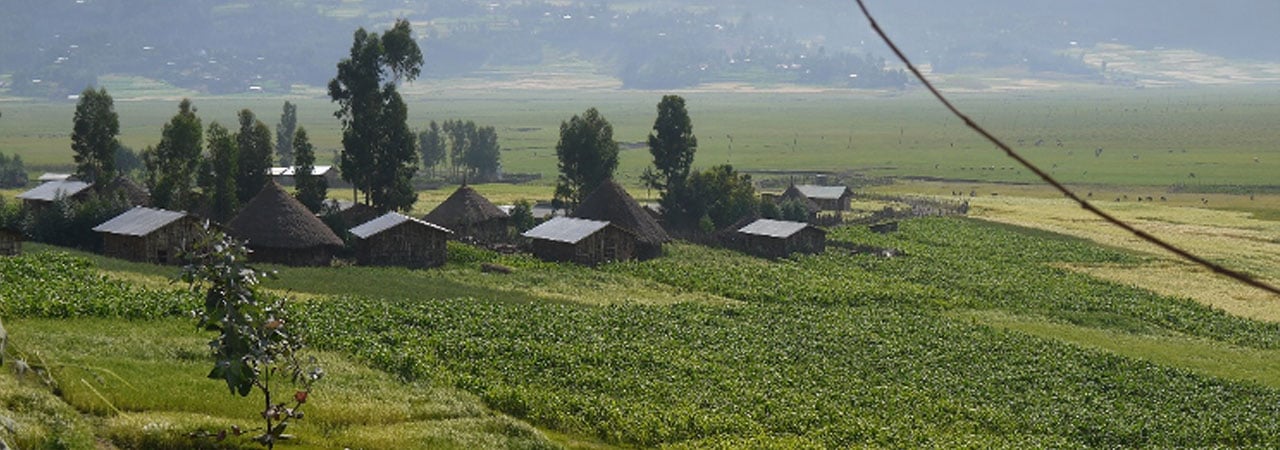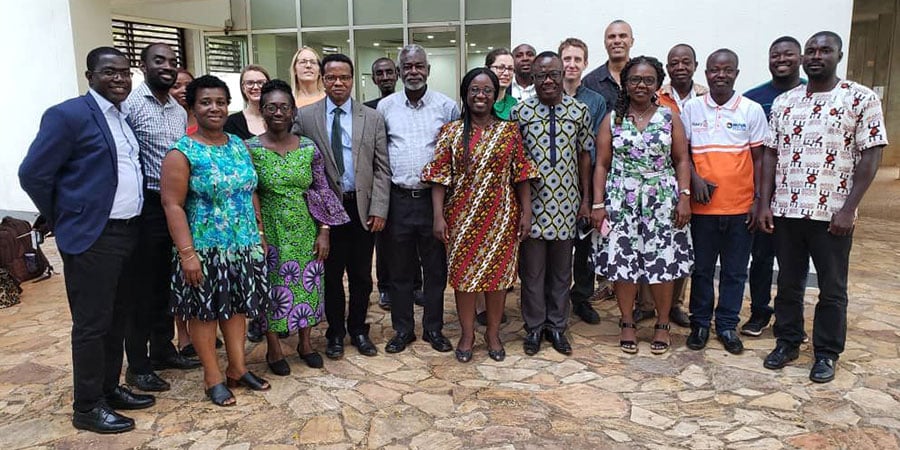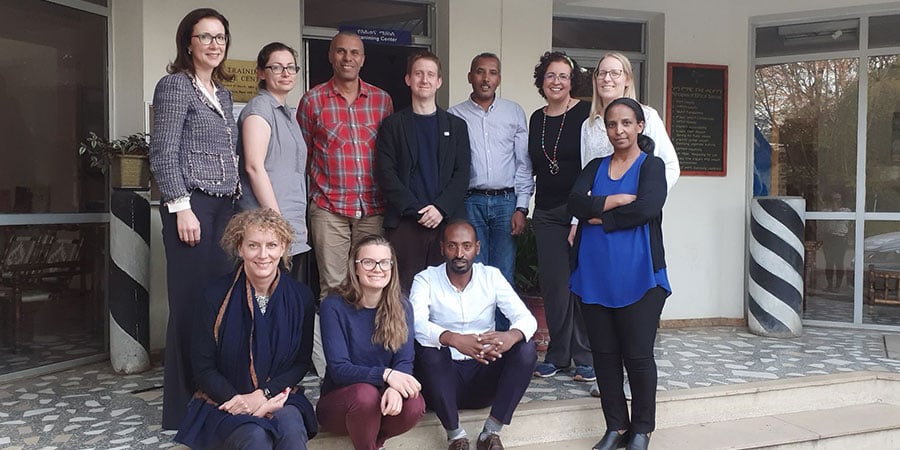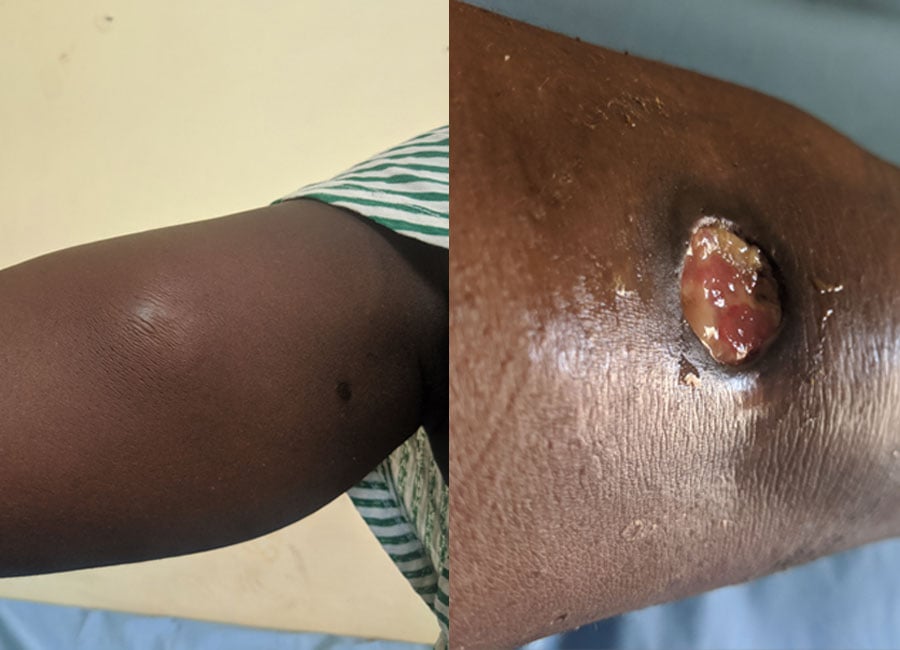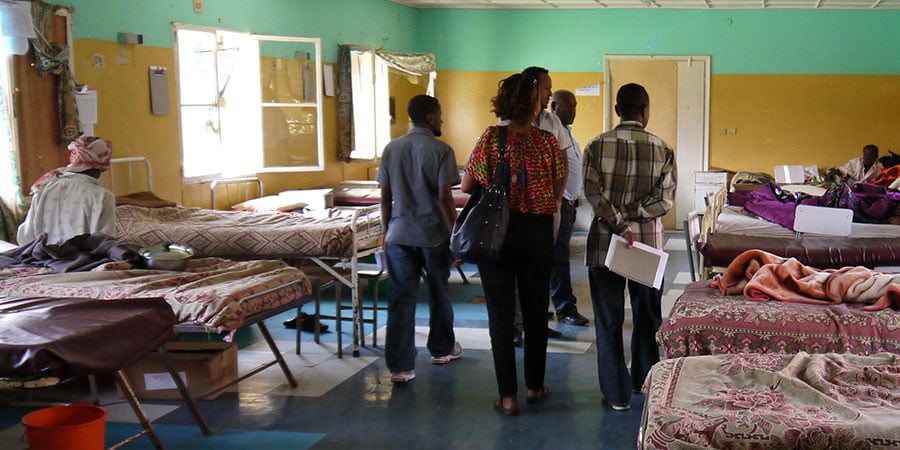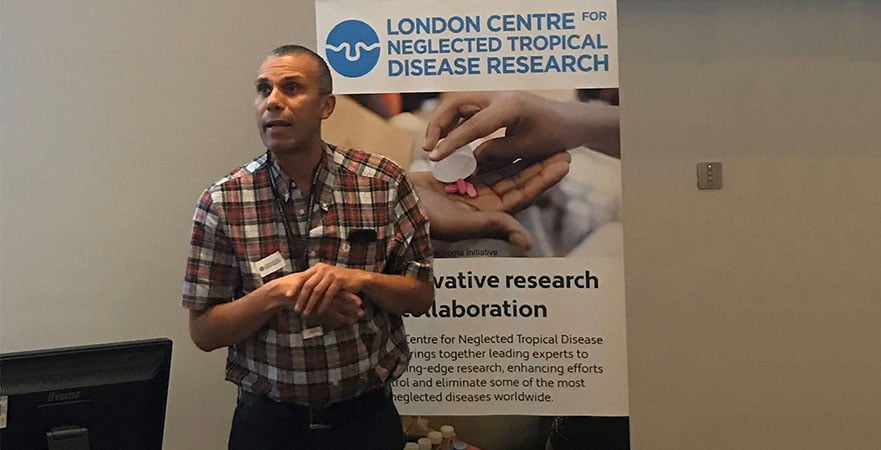Funded by the UK’s United Kingdom National Institute for Health Research, we are an experienced group of researchers with wide-ranging skills: epidemiology, clinical medicine, social sciences and anthropology, clinical trials, health economics, public health, laboratory sciences and diagnostics. Together, we will take a broad approach to the common problem of skin disease to help deliver healthy skin and healthy lives.
Neglected tropical diseases of the skin - such as Buruli ulcer, cutaneous leishmaniasis, leprosy, and yaws - are associated with physical disability, psychological distress, financial hardship, and social isolation. Conducted with affected individuals, communities, and other stakeholders, our research programme comprises three projects in Ethiopia and Ghana.
Working in Partnership in Ghana and Ethiopia
The Skin Health Africa Research Programme (SHARP) is a collaboration between the London School of Hygiene & Tropical Medicine, the University of Ghana, the Kwame Nkrumah University of Science and Technology (Ghana), the Addis Ababa University, and the Armauer Hansen Research Institute (Ethiopia). We are an experienced group of researchers with wide-ranging skills: epidemiology, clinical medicine, social sciences and anthropology, clinical trials, health economics, public health, laboratory sciences and diagnostics. Together, we take a broad approach to the common problem of skin disease to help deliver healthy skin and healthy lives.
Funding
SHARP is funded by the United Kingdom National Institute for Health Research via the Research and Innovation for Global Health Transformation (RIGHT) scheme (2019-2023).
We are an experienced group of researchers with wide-ranging skills: epidemiology, clinical medicine, social sciences and anthropology, clinical trials, health economics, public health, laboratory sciences and diagnostics.
A full list of our team members will be added soon. For now, we include the lead investigator at each of our five partner institutions:
London School of Hygiene & Tropical Medicine, United Kingdom
Kumasi Centre for Collaborative Research in Tropical Medicine, Ghana
Noguchi Memorial Institute for Medical Research, University of Ghana
Armauer Hansen Research Institute, Addis Ababa, Ethiopia
Addis Ababa University, Ethiopia
Aim
The programme aims to identify strategies for improving experiences of neglected tropical diseases (NTDs) of the skin which are severe and stigmatising.
Rationale
Skin disease is a leading cause of global chronic disease burden and morbidity. Skin NTDs such as Buruli ulcer, cutaneous leishmaniasis, leprosy and yaws are associated with physical disability, psychological distress, financial hardship and social isolation. In communities affected by skin NTDs there is also an enormous burden of other skin diseases caused by other infections which needs to be addressed. These more common diseases of the skin are also associated with stigma and reduced quality of life and may confound the diagnosis of skin NTDs.
The World Health Organization has identified opportunities for combining efforts to identify and manage different skin NTDs and has developed training guides for health workers. One rationale for a combined or “integrated” approach is that the implementation of two or more skin NTD-related activities in communities should be a more efficient use of scarce resources. An integrated approach to skin NTDs which tackles more common skin diseases may be more acceptable and have greater impact. The best strategies to diagnose and treat multiple NTDs affecting the skin in a single programme need to be identified.
Our activities
Conducted with affected individuals, communities, and other stakeholders, our research programme comprises three projects:
- A randomised-controlled trial to compare the effects of a novel wound dressing on the healing of Buruli ulcer in Ghana
- A cohort study of individuals diagnosed with cutaneous leishmaniasis in Ethiopia
- Development and testing of active case finding systems for skin NTDs in Ghana and Ethiopia
Three themes cut across all our work:
- Understanding and addressing stigma
- Capacity building
- Economic evaluation
If untreated, early Buruli ulcers can progress to large ulcers which may involve the whole limb. With antibiotic treatment and good wound care patients can make an excellent recovery.
The following resources provide further information on neglected tropical diseases of the skin:
- ENLIST - The Erythema Nodosum Leprosum International STudy group
- International Alliance for the Control of Scabies
- International Foundation for Dermatology
- London Centre for Neglected Tropical Disease Research
- Neglected Tropical Diseases Modelling Consortium
- Tropical Dermatology Short Course at LSHTM
- World Health Organization resources on skin NTDs, including pictorial training guide
On the first World NTD Day, Steve Walker presented about SHARP at an event organized by the London Centre for Neglected Tropical Disease Research (LCNTDR). The gathering included more than 145 attendees and a keynote address by Catherine West, a member of parliament and chair of the All-Party Parliamentary Group for Malaria and NTDs.
Read more about the World NTD Day.
The London School of Hygiene & Tropical Medicine (LSHTM) is to co-lead a major new project to identify the best ways to improve the diagnosis, treatment and quality of life of people with neglected tropical diseases (NTDs) of the skin.
Read more about the £5 million project.
The SHARP team held highly productive meetings in Addis Ababa, Ethiopia on 2-3 December and in Accra, Ghana on 5-6 December, 2019 to kick off the research programme. Members of the LSHTM team first joined researchers from AHRI and Addis Ababa University for a two-day meeting in Addis before flying to Accra for a second two-day meeting with researchers from KNUST/KCCR and the Noguchi Memorial Institute at the University of Ghana. While some members of the team are longstanding collaborators, these face-to-face meetings also allowed other members of the team to meet one another for the first time. Presentations were given on all aspects of the research programme and plans agreed for how to take the research forwards. External stakeholders participated in both meetings and provided valuable guidance on how to ensure that the research programme produces positive change for individuals and communities affected by neglected tropical diseases of the skin.

